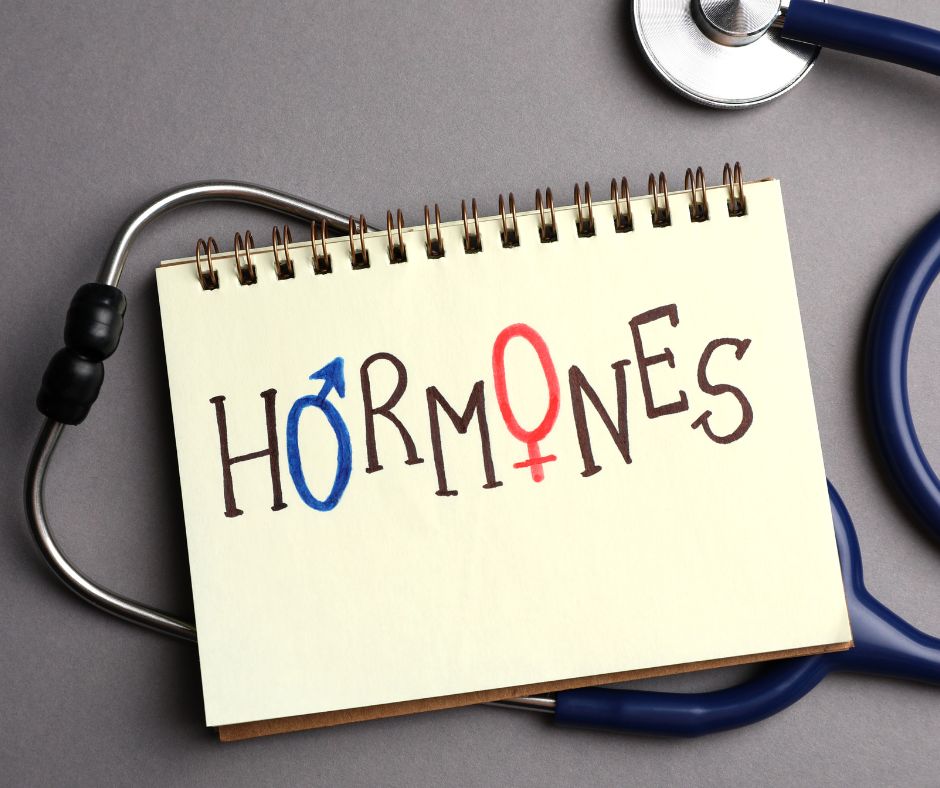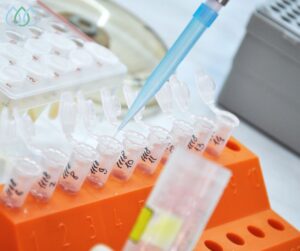BHRT
Welcome to the captivating world of bioidentical hormone replacement therapy (BHRT), an innovative and natural approach to addressing hormonal imbalances that’s here to offer a refreshing alternative to conventional hormone replacement therapy (HRT). Embrace the warmth and support of a treatment designed to work in harmony with your body, providing you with a personalized path towards optimal hormonal health.
(Yes, our Naturopathic doctors at Higher Health can prescribe BHRT as part of your customized health plan.)
BHRT uses hormones that are chemically identical to the ones your body produces, allowing them to be more easily recognized and utilized. This means that you’re likely to experience a smoother, more effective treatment process compared to conventional HRT, which often relies on synthetic hormones that may not be an ideal match for your body’s needs.
On the other hand, synthetic hormones are chemically modified versions of natural hormones. While they can still have a therapeutic effect, their structural differences can sometimes make them less compatible with your body’s hormone receptors. This mismatch can potentially result in less effective treatment or even cause unwanted side effects.
Common hormones used in BHRT and how they can help you
Estrogen: Estrogen is a vital hormone for women’s health, responsible for regulating the menstrual cycle and maintaining bone density, among other functions. In BHRT, different forms of estrogen, such as estradiol and estriol, can be used to help alleviate symptoms of menopause or other estrogen deficiencies.
Progesterone: Progesterone plays a crucial role in maintaining the balance of female hormones and supporting a healthy pregnancy. In BHRT, natural progesterone is often used to counteract estrogen dominance, treat symptoms of menopause, or address other hormonal imbalances.
Testosterone: Testosterone is essential for both men and women, affecting muscle mass, bone density, and sex drive. BHRT can use bioidentical testosterone to treat low testosterone levels (hypogonadism) in men, and in some cases, to address certain hormonal imbalances in women.
Thyroid hormones: Thyroid hormones, such as T3 and T4, regulate metabolism and energy production in the body. BHRT can help individuals with underactive thyroid (hypothyroidism) by providing bioidentical thyroid hormones that support optimal thyroid function.
Where do they come from?
Bioidentical hormones are typically derived from natural plant sources, such as soybeans and wild yams. These plants contain compounds called phytoestrogens, which have a similar structure to human hormones. Through a series of chemical processes, these compounds are converted into bioidentical hormones that are identical to those produced by your body.
Once the bioidentical hormones have been created, they can be compounded into various forms, such as creams, gels, pills, or patches, to provide personalized treatment options tailored to an individual’s unique hormonal needs. This customization allows healthcare providers to fine-tune the dosage and delivery method for each patient, ensuring the most effective and well-tolerated treatment possible.
Benefits of BHRT
Customized treatment plans
One of the most remarkable aspects of BHRT is its ability to provide customized treatment plans that cater to your unique hormonal needs. You’re not just another number in the system; with BHRT, you’re an individual with a specific hormonal landscape that deserves personalized care and attention. By working closely with your healthcare provider, you can develop a tailored plan that targets your specific imbalances and helps you achieve optimal hormonal harmony. It’s like having a bespoke suit crafted just for you, ensuring the perfect fit and maximum comfort.
Potential for fewer side effects
We all know how frustrating and challenging it can be to deal with unwanted side effects from treatments. But with BHRT, you can breathe a sigh of relief knowing that its use of bioidentical hormones, which are identical to those produced by your body, may result in fewer side effects compared to synthetic hormones. This means you can focus on the healing journey ahead, without the added stress of battling unpleasant side effects that could potentially slow down your progress.
Alternative delivery methods
We’re all unique, and so are our preferences when it comes to the way we receive our treatments. That’s why BHRT offers a variety of alternative delivery methods to suit your individual needs and lifestyle. From creams and gels to pills and patches, there’s something to accommodate everyone. With the help of your healthcare provider, you can choose the method that works best for you, ensuring that your treatment experience is as smooth and enjoyable as possible.
Holistic approach to health and well-being
At the heart of BHRT lies a holistic approach to health and well-being that encompasses not just your hormonal balance, but your overall wellness. This comprehensive perspective is all about treating the whole person, not just the symptoms. With BHRT, you can embark on a journey towards better health that addresses the root causes of your hormonal imbalances and empowers you to make lasting, positive changes in your life. So get ready to embrace a brighter, more balanced future, where you can enjoy a renewed sense of vitality and well-being.
When should BHRT be considered as part of a health plan?
Menopause and perimenopause
For many women, the transition into menopause and perimenopause can be a rollercoaster of emotions and physical changes. BHRT offers a gentle, compassionate approach to help navigate these turbulent waters, providing relief from symptoms such as hot flashes, night sweats, mood swings, and more. By restoring hormonal balance, you can rediscover a sense of peace and comfort, allowing you to embrace this new chapter of life with grace and ease.
Andropause
Men aren’t immune to the effects of hormonal changes either. As they age, they may experience a gradual decline in testosterone levels, a phenomenon sometimes referred to as andropause. BHRT offers a supportive and understanding solution for men dealing with symptoms such as fatigue, low libido, and loss of muscle mass. With bioidentical testosterone therapy, men can reclaim their vitality and regain the energy and strength they need to live life to the fullest.
Adrenal insufficiency
Our adrenal glands play a crucial role in our overall health, producing hormones like cortisol that help us manage stress and maintain energy levels. When these glands aren’t functioning optimally, adrenal insufficiency can arise, leading to symptoms such as chronic fatigue, weakness, and difficulty concentrating. BHRT provides a nurturing approach to help restore adrenal function and bring balance back to your body, allowing you to regain the energy and resilience you need to thrive.
Thyroid disorders
Thyroid disorders, such as hypothyroidism or hyperthyroidism, can have a profound impact on your well-being, affecting everything from your metabolism to your mood. With BHRT, you can address these imbalances using bioidentical thyroid hormones that are specifically tailored to your body’s unique needs. This personalized approach can help you regain control over your thyroid function and rediscover a sense of balance and harmony in your body.
Other hormone-related conditions
BHRT’s versatility doesn’t end there. Its gentle, individualized approach can be applied to a wide range of other hormone-related conditions, such as polycystic ovary syndrome (PCOS), endometriosis, or insulin resistance. By addressing the root cause of these conditions and restoring hormonal balance, BHRT can help you reclaim your health and well-being, empowering you to live your best life, free from the constraints of hormonal imbalances.



How do you know if BHRT is for you?
Embarking on a journey towards hormonal balance is a deeply personal and important decision, one that should be made with all the information and understanding available to you. By learning about BHRT and its potential benefits and risks, you empower yourself to make an informed decision that is best suited to your unique needs and circumstances. It’s essential to take the time to research, ask questions, and weigh the pros and cons before diving into any treatment plan. You can always connect for a free consultation with one of our naturopathic doctors at Higher Health.
Remember, this is your health, your body, and your life. Taking charge of your well-being means making decisions that are rooted in knowledge and confidence, ensuring that your path towards hormonal harmony is as smooth and successful as possible.
The role of healthcare providers in guiding and supporting patients
Healthcare providers play an invaluable role in guiding and supporting patients as they navigate the world of BHRT. They are your allies, your mentors, and your champions, providing expert advice, answering your questions, and offering a compassionate, listening ear when you need it most. Their experience and expertise in hormone health can help you develop a tailored treatment plan that addresses your specific hormonal imbalances, ensuring the best possible outcome for your health and well-being.
In addition to their medical knowledge, healthcare providers also bring a wealth of emotional support and understanding to your journey. They recognize the challenges that come with hormonal imbalances and are committed to helping you overcome them, every step of the way. By partnering with a dedicated healthcare provider, you gain not only access to cutting-edge BHRT treatments but also the unwavering support and guidance you need to successfully navigate your path towards hormonal balance and overall wellness.
Now that you’ve gained valuable insights into the world of bioidentical hormone replacement therapy, it’s time to take the first step towards a life of balance and vitality. We invite you to book a complimentary hormone consultation call with one of our naturopathic doctors.
Together, we’ll explore your unique needs, answer your questions, and help you uncover the best path to reclaiming your well-being. Don’t let hormonal imbalances hold you back any longer. Let our compassionate team guide you on your journey to a healthier, happier you. Seize the moment and schedule your free consultation today – your future self will thank you!
Click here to Book your Free consultation.
References:
Holtorf, K. (2009). The bioidentical hormone debate: are bioidentical hormones (estradiol, estriol, and progesterone) safer or more efficacious than commonly used synthetic versions in hormone replacement therapy? Postgraduate Medicine, 121(1), 73-85. https://www.tandfonline.com/doi/full/10.3810/pgm.2009.01.1949
Schwartz, E. T., & Holtorf, K. (2012). Hormones in wellness and disease prevention: common practices, current state of the evidence, and questions for the future. Primary Care: Clinics in Office Practice, 39(4), 673-692. https://pubmed.ncbi.nlm.nih.gov/18928825/
North American Menopause Society. (2017). The 2017 hormone therapy position statement of The North American Menopause Society. Menopause, 24(7), 728-753. https://journals.lww.com/menopausejournal/Abstract/2017/07000/The_2017_hormone_therapy_position_statement_of_The.5.aspx
Cirigliano, M. (2007). Bioidentical hormone therapy: a review of the evidence. Journal of Women’s Health, 16(5), 600-631. https://www.liebertpub.com/doi/10.1089/jwh.2006.0311
Women’s Health Initiative. (2002). Risks and benefits of estrogen plus progestin in healthy postmenopausal women: principal results from the Women’s Health Initiative randomized controlled trial. JAMA, 288(3), 321-333. https://jamanetwork.com/journals/jama/article-abstract/195120








